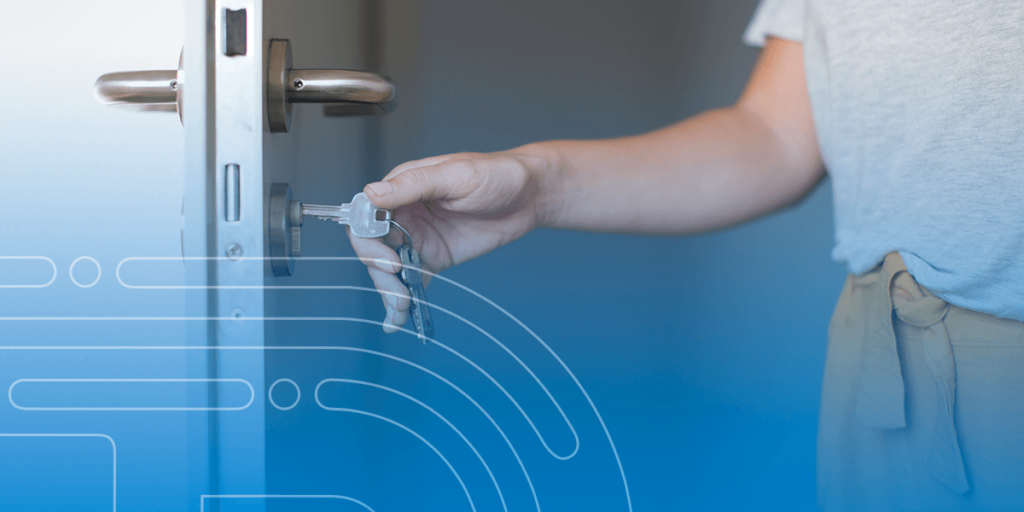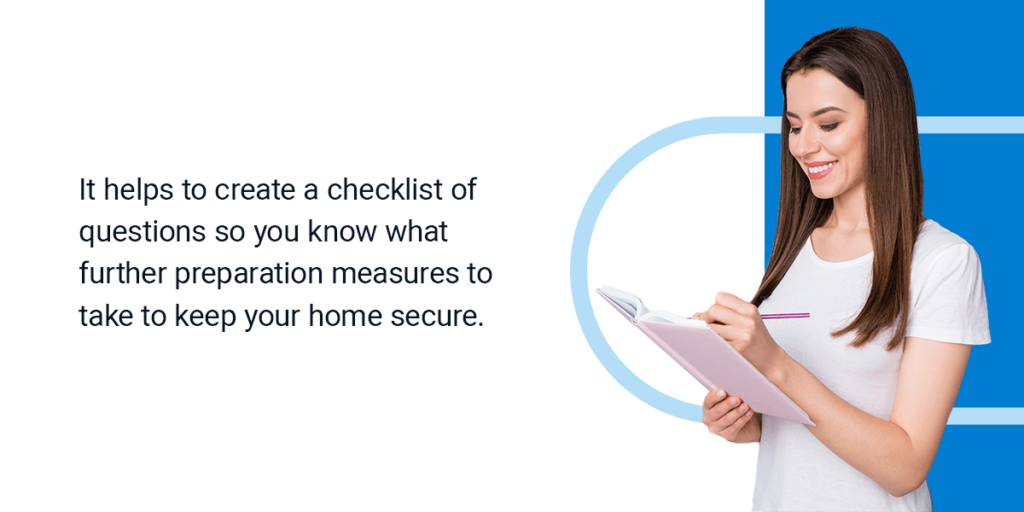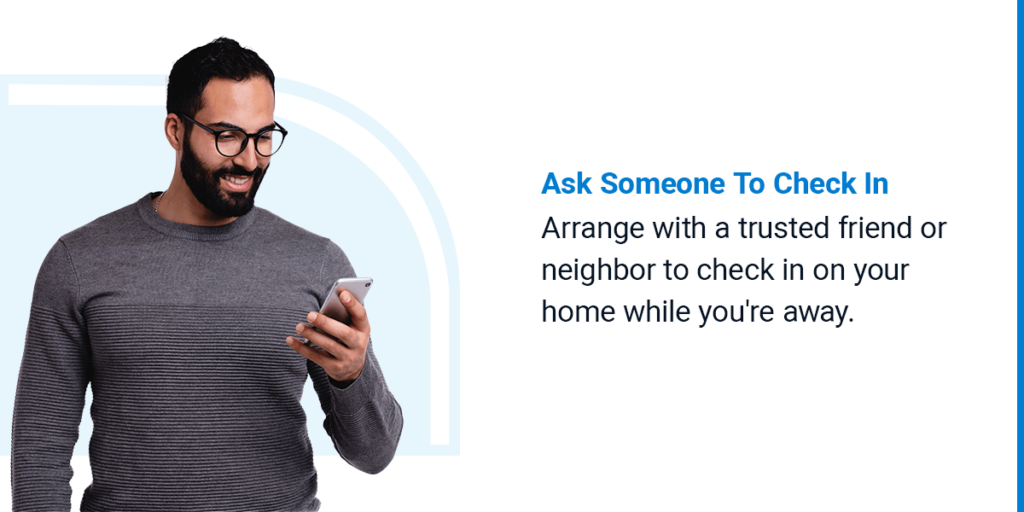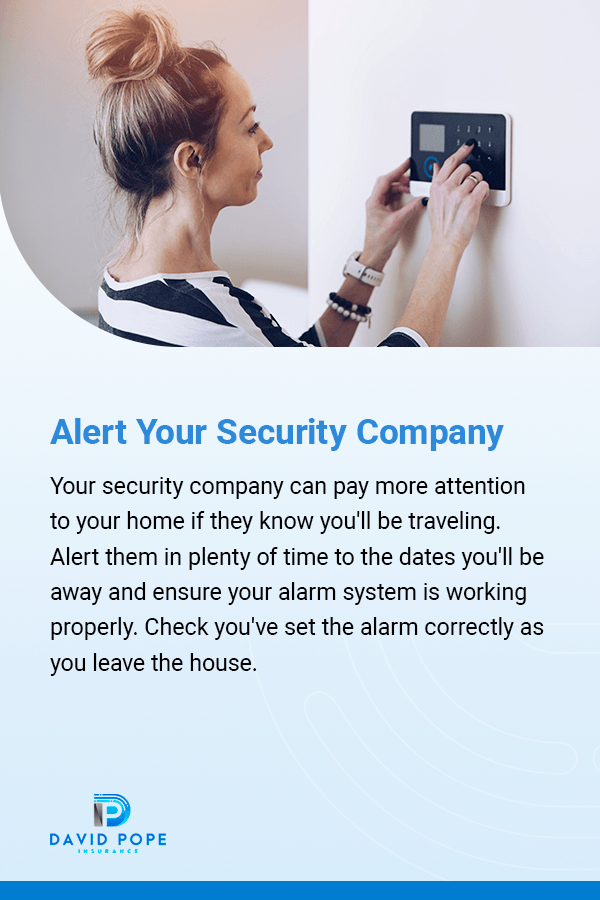
Going on vacation is relaxing — a chance to unwind and take a break from the demands of your daily life. However, leaving your home unattended while you’re away can be a source of anxiety. Anything can happen while you’re vacationing, and careful planning and preparation can bring you much peace of mind.
With over one million home burglaries in the U.S. annually, knowing how to protect your home while on vacation is essential. With a few basic steps and home safety tips, you can protect your home so you can enjoy your vacation to the fullest.
Whether you’re preparing your house for an extended vacation or a short holiday, you want to know everything is in order before you leave. It helps to create a checklist of questions so you know what further preparation measures to take to keep your home secure. Before you start your preparation, ask yourself the following questions to ensure you have everything covered:

The longer you’ll be away, the more detailed your preparation should be. If you’re planning an extended vacation, more people will likely notice your home is unoccupied, so you’ll need extra security precautions.
Burglars tend to return to the same areas, so find out whether there have been incidents in your neighborhood in the past. If you’re leaving home at a popular vacation time, others in your community could be doing the same, making the area attractive to criminals. If you have had burglaries nearby, take extra precautions to protect your home.
If you know and trust your neighbors, asking them to look out for unusual or suspicious activity could be valuable. While they may be unable to prevent a home invasion, they can alert the authorities, getting help on the scene and limiting losses.
Consider informing your neighbors when you go away so that they can keep an eye on your home. If you don’t know them well, consider who else you can ask to drive past occasionally. A trusted friend or family member may not be in the immediate area, but they can watch for anything suspicious.
Should there be an incident while you’re away, you want to know you’re covered for losses or damage. Check your current homeowners insurance and consider informing your provider you’re going away, so they can take you through your coverage. You may have additional coverage options while you’re away. It might be worth taking out extra cover if you’re away for an extended period.
Vacation-proofing your home starts on the outside, as one of your primary concerns is to make it look occupied while you’re away. The following safety tips can help keep would-be thieves at bay, protecting your home while you’re enjoying a stress-free vacation:
An overgrown lawn is a telltale sign you haven’t been home in a while. Ensure you mow your lawn just before you leave, or shovel your driveway if you’re vacationing in winter. If you’re going away for an extended period, arrange for someone to come in and mow your lawn.
Take a walk around your home and look for overgrown bushes that obstruct the view into your home. Burglars can use overgrown bushes as cover while they open a door or window on the first floor, so take the time to trim the bushes back.
Tell your local post office you won’t be home and ask them to hold your mail. Do the same with newspapers and other deliveries, as mail and packages piling up outside your door indicate no one is there. If someone else unwittingly delivers a package, ask your neighbors to hold on to it for you to prevent theft.
It might be part of your routine to leave your spare keys under your welcome mat or in a potted plant, but thieves know all the tricks. Instead, leave your spare key in the house or entrust it to a friend.
A dark home exterior is another clear sign your house is empty. Consider a smart lighting system, so you can set your lights on a timer to come on in the evening. Timed lighting makes your home look occupied and saves on energy costs.
Arrange with a trusted friend or neighbor to check in on your home while you’re away. They can report unusual activity, neaten things and give you peace of mind. Please provide them with all the contact details for your security company or the local authorities so that they can arrange help.

Keep ladders and tools locked up and out of sight while on vacation. An accessible ladder is an opportunity for criminals to try and gain access to the upper floors of your home. They can use some tools to pick your locks or pry your doors.
Having a car in the driveway gives the impression there is someone in the house. If you’re using your car for your vacation, ask a neighbor to park theirs on your driveway.
A GPS in your car at the airport could make your home accessible to thieves. They could break into your vehicle and use it to drive straight to your home, safe in the knowledge you won’t be there. Remove your portable GPS from your car and lock it somewhere safe. If you have a built-in GPS, remove the home setting or change it to a public park or somewhere full of people.
A monitored security system is one of the most effective ways to protect your home while on vacation. It’s a deterrent for thieves and gives you an added layer of security if you can’t access your phone while you’re away. Consider installing sensors in your home that activate if doors and windows open, alerting your security company and triggering an alarm so your neighbors are aware of the disturbance.
Remember, your trash still needs to be collected while you’re away. Ask a friend or neighbor to take your trash out on collection day so they still get removed. Keeping your trash collection organized prevents your home from appearing empty and means you come home to clean trash cans with no new pests.
Locking your home when you leave might seem obvious— paying extra attention before you leave could save you from missing something. Check all your outside doors before you leave, including the garage door. Even if your garage doesn’t grant access to your home, it is still an opportunity for thieves to take what is stored inside.
You can do plenty inside your home to keep it safe while you’re away, from making it look occupied from the inside to preventing water damage. Consider the following interior home tips for keeping your home safe while on vacation:
Being on vacation is exciting, and it’s natural to want to share your countdown on social media, followed by pictures of you enjoying your well-deserved break. As tempting as it is to share your excitement, it might send criminals directly to your front door. Instead, wait until you’re safe at home before posting any photographs online.
A dark house is likely to appear unoccupied, but so is one where the lights are always on. Leaving your lights on is also expensive and a potential fire hazard. Put your interior lights on a timer so they’re not on or off the whole time. You can also buy a lamp or two and put those on a timer, which could be more cost-effective than setting up the entire house.
When someone breaks into your home, they will likely target the most valuable possessions, like computer equipment and jewelry. Remove all valuables from the windows to prevent easy access, and lock up whatever you can. If you can’t lock them away, scatter your prized possessions around the house and aim to place them in unexpected locations, like the kitchen cupboards.
A burglar might only break into your home if they can see valuables straight away, as they want to get in and out as fast as possible.
Unplugging appliances like toasters, microwaves and phone chargers can save you money, as these items pull electricity even when you’re not using them. You can save on energy bills and protect your appliances from power surges by simply unplugging them.
Set your thermostat depending on the time of year. Unless you have pets at home, you can set it at around 90 degrees or turn it off altogether. If you’re vacationing in winter, maintain your thermostat temperature at 55 degrees to avoid your pipes freezing, which can result in expensive damage to your home.
It’s easy to forget the items in your refrigerator before you go on vacation. Remove all perishable foods from your refrigerator before you leave, so your home will smell as fresh when you return as it did when you left.
Your security company can pay more attention to your home if they know you’ll be traveling. Alert them in plenty of time to the dates you’ll be away and ensure your alarm system is working properly. Check you’ve set the alarm correctly as you leave the house. Ask your security company if you can monitor your home with your smartphone for extra peace of mind.

If you’re going away in the colder months, take preventive measures to ensure your pipes don’t freeze. Insulate them in vulnerable areas like the attic and basement. Double-check you’ve set your thermostat correctly. Ask the friend or neighbor checking on your home while you’re gone to run the taps when they stop by.
Would-be thieves are alert to any changes in your routine. If you have any cleaners or maintenance staff on a regular schedule, ask them to continue coming at their standard times while you’re on vacation. You should be able to trust these service providers, but if you have any reservations, don’t take the chance. Ask them not to come, but don’t tell them you’re going on vacation.
Anyone looking to enter your home will watch the curtains for signs that no one is home. Try and replicate whatever you usually do with your curtains while you’re away, as suddenly closing all the blinds could be a giveaway. If you have a friend or neighbor coming by, ask them to close the curtains in the evenings and open them in the mornings.
Sensor lights are a cost-effective option for alerting neighbors if anyone comes onto your property while you’re away. You can pick them up at most hardware stores and set them up yourself. As sensor lights are activated by motion, they are a powerful deterrent to burglars who don’t want anyone to see them approaching your home.
Thieves are a significant threat to your home and belongings while on vacation. Still, internal hazards include fire and water damage, which can be costly and inconvenient. You can prevent flooding by repairing leaks and faulty valves before you leave or even shutting off the bathroom and kitchen water supply. Unless you want someone to come in and water your lawn while you’re away, consider shutting off the water to the exterior of your home as well.
Unattended fires spread quickly, so preventing fires from starting while you’re away is essential. Check your smoke detectors are working and reduce the chances of electrical fires by switching off and unplugging any unnecessary electrical appliances, including computers, fans, lamps and coffee makers.
Having someone in your house is more effective than giving outsiders that impression. If you are more comfortable, consider hiring a house sitter when you’re away. If you have pets, a house sitter is an excellent option, as it’s less disruptive for them and more secure for you. Consider a friend or family member, as you know, and trust them to look after your home.
If you need to hire a professional house-sitter, ensure you go through a quality agency that vets their staff thoroughly.
Comprehensive planning can prevent opportunists from entering your home or unnecessary fire or water damage. However, sometimes unavoidable things happen, and when they do, you need the backing of a trustworthy insurance provider to help you rebuild. David Pope Insurance offers reliable home coverage throughout Missouri — the type of quality insurance that gives you peace of mind.
Our local agents will work hard to get you the lowest rates on the market so you can enjoy your holiday without financial insecurity. Request a quote and see our insurance rates firsthand, or feel free to reach out with any questions.
